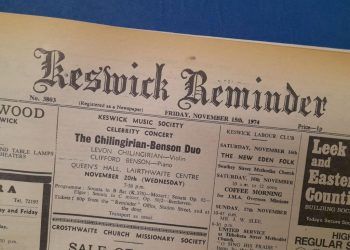
Nobbut Laiking, by Ross Brewster
Cricket has taken a real battering, as savage as any attack by Ben Stokes on a worn ball that’s just done 70 overs on a dry and dusty wicket.
It has been condemned as racist, sexist and elitist at all levels of the game. A report published by the Independent Commission For Equality In Cricket, entitled Holding Up A Mirror To Cricket, demands urgent reform.
If I was a parent sending my kids down to their local club I’d think twice after hearing this damning assessment of the state of the game.
Clearly cricket has major issues. But is it really that appalling? I don’t get down to games as much as I once did, not since the last of the summer wine joined the ranks eternal of those waiting for a bat in some heavenly fixture.
Our local Compo, Foggy and Clegg shared a bench. Sometimes I got to join them. A sort of twelfth man. Since Covid sadly, one by one, they have departed. It’s not quite the same without their trenchant observations on the state of play.
But what I do see is a club, essentially local, and its small but determined group of volunteers providing cricket and coaching for a wide range of players. Juniors in the nets, girls and women playing in their leagues and matches most weekends at all standards.
The report, originally commissioned by the England Cricket Board, says much about what’s wrong in the game with its 44 recommendations in 317 pages.
Evidence was gathered from 4,000 people. I have no idea who they quizzed. But it seems a shame, in highlighting cricket’s weaknesses, very little is said about the many good aspects of the game and the enthusiasts who keep it going.
The cricketing authorities have taken the findings on board, but don’t throw overboard the many positives about this wonderful game, many of which are exemplified on the sporting fields of Cumbria.
The day I realised that I should have kept a diary
“Woke up. Watched Grandstand. Wrote Candle in the Wind. Went to London and bought a Rolls-Royce. Ringo Starr came for dinner.”
I doubt there has been a better diary entry, ever, than Elton John’s record of one day in 1973.
Diaries can be entertaining, embarrassing and sometimes plain useful when it comes to pinning down dates and times.
A reader collared me in the street the other day. “When’s t’ book coming out then,” he inquired.
Sadly I had to inform him there is no book. Oh yes, I’ve got a head crammed with stories of a lifetime in journalism. But no diary, no book.
My greatest regret is never having stuck at it and kept a diary of dates and events.
It hit home the other day when I dug out the diary I kept up to date for the entirety of one year. The year printed on the red cover of the Letts School-Boys Diary (their punctuation not mine) is the giveaway as to why it would not be a lot of use when penning my memoirs — 1958 when I was 11.
The entries were fastidiously maintained, but not quite aspiring to Glastonbury saviour Sir Elton’s broad range.
Life seems to have been more prosaic. Dental appointments, bad colds, playing football with my next door neighbour William, secretly listening to Radio Luxembourg when I should have been asleep and the occasional treat of a trip to the cinema.
One red letter day does stand out, an event that was to affect the next 65 years of my life. My first visit to Brunton Park to see Carlisle United beat Stockport County 3-1. Two goals from Alf Ackerman and the other for Tulloch.
“Very good game,” was my brief summary of the match. What I didn’t say in my diary for Saturday, 12th April, was that I had fallen irrevocably in love. That I had found my team for life.
I must thank a Penrith reader who sent me a copy of his book of early life and memories growing up in wartime triggered by the discovery of cards and letters.
I don’t know if he owned a Letts diary. I used to get one every Christmas, along with a Bible from my religious aunt Edith. I had five of them. She clearly felt I needed spiritual guidance re-enforcing annually.
Starting work I always seemed too busy to keep up a diary and I never got round to it later. So when it comes to a book I have no real concept of who and where, and what Maggie Thatcher whispered discreetly to me. Or when I was identified as the offender by a witness in a case at the magistrates’ court. “It was ’im what I saw that night in the barn,” she announced, pointing at me as I cowered in the press box. Bad enough being criminalised, but in an unsavoury case, too.
I could never match Sir Elton as a diary keeper. But how I wish, in my dotage, I had taken the trouble to keep one filled with at least the most significant and colourful events in my life. Then there might have been a book.








